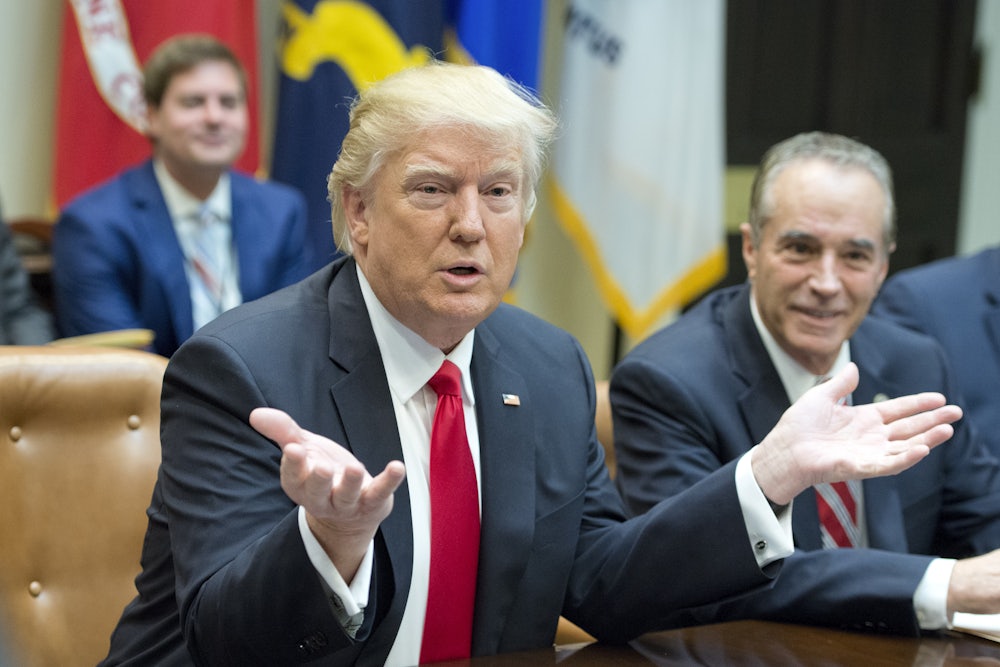Six years ago, Congress passed the STOCK Act, which for the first time made members of Congress liable for insider trading, just like any other investor. On Wednesday, the Justice Department issued the very first indictment under that law when it arrested Representative Chris Collins, Trump’s earliest supporter in Congress, and accused him of sharing inside information about an Australian pharmaceutical company with his son and other investors.
Last year, Collins allegedly learned, before the public did, about the failure of a clinical trial for a multiple sclerosis drug by Innate Immunotherapeutic. He told Cameron Collins, his son and a fellow shareholder, who dumped his stock. Cameron then distributed the information to at least six other investors, who also sold the stock before news broke about the failed trial, dropping the stock price by 92 percent. All told, the defendants and their friends avoided over $768,000 in losses, according to the indictment.
The STOCK Act was intended to prevent members of Congress, who have access to all kinds of non-public information, from using their knowledge to make money for themselves and others. But Collins came by his information in a different, almost unbelievable way: He was on the board of directors of Innate Immunotherapeutics while also serving in Congress. Collins also held 16.8 percent of the company’s stock, and he was the company’s unofficial tout on Capitol Hill, getting at least six colleagues—including, at one point, former Health and Human Services Secretary Tom Price—to buy shares.
Meanwhile, Collins sits on the House Energy and Commerce Committee’s health subcommittee, a position that gives him policymaking responsibilities over the pharmaceutical industry. As many Americans are learning for the first time today, there is no law prohibiting a congressman from serving as a corporate board member—even if that congressman specializes in policymaking that covers that corporation’s industry.
The details in the indictment are comical in the retelling of such naked corruption. When Collins learned about the failure of the multiple sclerosis drug trial, Innate Immunotherapeutics had halted trading on its shares at the Australian Stock Exchange, a routine circumstance when a company receives important news that they will later make public. But the U.S. over-the-counter market did not stop trading Innate, giving insiders the chance to financially benefit.
On June 22, 2017, Collins was at the White House Congressional Picnic when he got an email from Innate’s CEO about the “extremely bad news” from the clinical trial. Innate had put most of its hopes in the success of the multiple sclerosis drug, but it proved ineffective.
Collins got the email at 7:10 p.m. He wrote back, “Wow. Makes no sense. How are these results even possible???” Because Collins’s stock was held in Australia, where trading was halted, he couldn’t get his big stake out of the company. But his son Cameron had shares in Innate with a U.S. broker, which meant he could dump them.
From inside the White House, Collins immediately called his son, and they exchanged seven calls before finally connecting. Father and son had a short discussion, and the next morning Cameron began the first sale orders of what would eventually be a dumping of 1,391,500 shares, before release of the information on June 27. Cameron Collins also informed other shareholders, and at least six dumped their shares in Innate.
When news of the clinical trial failure broke, Collins’s spokesperson gave a statement to a local paper that “Cameron Collins has liquidated all his shares after the stock halt was lifted, suffering a substantial financial loss,” conveniently leaving out the 1.39 million shares Cameron Collins sold prior to that point.
While all this was going on, Chris Collins was already under investigation by the Office of Congressional Ethics, an independent watchdog, about his relationship with Innate. Collins was a co-author of the 21st Century Cures Act, which included provisions that would accelerate the approval process for drugs like the multiple sclerosis treatment being developed by Innate. He encouraged a National Institutes of Health employee to meet with Innate about its clinical trials in 2013.
Collins was also popping off to anyone who would listen about what a great investment opportunity Innate was, leading Republican representatives Markwayne Mullin, Billy Long, John Culberson, Mike Conaway, and Doug Lamborn to buy shares. Tom Price got in under a special discounted offer available to less than 20 people in the U.S. After being nominated for Health and Human Services secretary, Price sold his shares; it’s unclear if the others were tipped off. (Lamborn still owned shares as of last October—unfortunately for him, as they’re effectively worthless.)
The Office of Congressional Ethics released its findings in the Collins case last October, stating that “there is a substantial reason to believe that Representative Collins shared material non-public information in the purchase of Innate stock,” in violation of House rules and federal law. But they merely referred the matter to the House Ethics Committee, where it has sat; the committee didn’t even open a full-scale investigation.
One response to this is to say that all stock holdings from members of Congress should be held in a blind trust during their congressional service. There’s too much information floating around Capitol Hill that members can use to their benefit, and too much they can personally do to ensure that certain stocks spike or plummet in price. Congress should also close loopholes that let members participate in initial public offerings or discounted private placements of stock.
But the Collins case suggests an even more elementary restriction: Members of Congress should never be able to sit on a board of directors of a public company. The temptation to use the office to promote the company is far too great.
